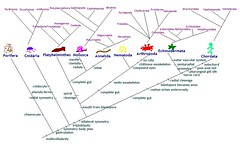Penmachine
21 June 2008
Quandary: should I see "Expelled" or not?
 Back in March I wrote about the dumb behaviour of the people who made the film Expelled: No Intelligence Allowed. Now, probably because of that posting and my other entries here about science, I've been invited by distributor KinoSmith to attend a press screening of the movie here in Vancouver next week. I'm wondering if I should bother to go.
Back in March I wrote about the dumb behaviour of the people who made the film Expelled: No Intelligence Allowed. Now, probably because of that posting and my other entries here about science, I've been invited by distributor KinoSmith to attend a press screening of the movie here in Vancouver next week. I'm wondering if I should bother to go.
Propagandumentary
First, some background about Expelled. It is a purported documentary, supposedly a Michael Moore–style critique of the current academic establishment of evolutionary biology. I enjoy a good intellectual debate, especially about topics as important to us as the development of life on earth, so if that's what Expelled really were, it might make an interesting film.
However, the evidence indicates that instead it is, in the words of New York Times reviewer Jeannette Catsoulis , "one of the sleaziest documentaries to arrive in a very long time [and] a conspiracy-theory rant masquerading as investigative inquiry." (That is the first line of her review.) Here, for instance, is a quote about Expelled from narrator Ben Stein:
Love of God and compassion and empathy leads you to a very glorious place. Science leads you to killing people.
It's fine for people to disagree, but a blanket line like "science leads you to killing people" is not only wrong, it's profoundly simplistic and inflammatory. Would religious people be likely to attend a movie promoted by lines like, "religion leads you to killing people"? I suspect, for instance, that many have been put off reading Christopher Hitchens's book God Is Not Great, with its chapter, "Religion Kills." (I haven't read it either, but not for that reason.)
Is it worth my time?
Okay, fine, so I'm not disposed to like the movie, but am I being closed-minded about it? Here's another issue. Totally beyond its mistaken premises, its misleading of interviewees, its senseless invocation of Hitler and Stalin as inevitable consequences of accepting natural selection, its plagiarism, and its promotion of intelligent design as a supposedly scientific idea instead of as a front for (mostly biblical) creationism, Expelled is also, by all indications, a lousy movie: poorly made, badly edited, patronizing, disorganized, and often dull.
Anyway, here's my quandary. I'm interested in finding out what all the fuss is about, so part of me thinks I should use the free double passes that arrived in the mail yesterday, and take three friends to see Expelled next Thursday. I wouldn't pay to see it, because I don't think the filmmakers deserve my money, but these are free tickets, and it's actually costing them for me to go.
On the other hand, I still remember seeing Highlander 2 back in 1991. That movie was so bad that it somehow made its predecessor worse: in my mind, it tainted the first Highlander film, which I had enjoyed. I get the feeling that Expelled is similarly bad, the kind of film that makes you wish you'd never seen it and had those few hours of your life back.
Probably not
We have a friend visiting from Australia for a couple of weeks, and our family would like to spend time with her. My daughters' final piano lesson is that same day. I suspect I have many better things to do, such as hanging out in my back yard, or maybe having a nap.
So, after my fine promotion here, does anyone want four free tickets to see Expelled next Thursday, June 26, 2008, at 7:00 p.m., at Tinseltown in downtown Vancouver? The tickets say, "Arrive early as theatre capacity is limited and seating is not guaranteed," by the way. Let me know if you want them, even if just for the hell of it. (Pun intended.)
Labels: biology, controversy, creationism, intelligentdesign, linkbait, movie, naturalselection, religion, science
21 March 2008
Some people have bad ideas
I like to give people the benefit of the doubt, but sometimes they squander it. A couple of examples.
A few months ago, I gave a bit of a mixed review to Why Beautiful People Have More Daughters, a book about evolutionary psychology. It turns out that the main author, Satoshi Kanazawa, has taken his ideas to at least one ridiculous and terrifying extreme:
Imagine that, on September 11, 2001, when the Twin Towers came down, the President of the United States was not George W. Bush, but Ann Coulter. What would have happened then? On September 12, President Coulter would have ordered the US military forces to drop 35 nuclear bombs throughout the Middle East, killing all of our actual and potential enemy combatants, and their wives and children. On September 13, the war would have been over and won, without a single American life lost.
Yes, we need a woman in the White House, but not the one who’s running.
Uh, okay.
That's straight-on crazy talk (not to mention almost certainly incorrect in its results). Doesn't raise my opinion of his book, that's for sure.
On the other side of the evolutionary aisle are the producers of Expelled, a documentary claiming that the academic and scientific establishment are unfairly quashing free speech, by shunning researchers who promote intelligent design/creationism and other "critiques" of evolutionary biology. The movie is hosted by Ben Stein (probably best known as the teacher who said, "Bueller? Bueller?"), and also apparently argues that accepting evolution leads inevitably to atheism, which then (get this) led to the Stalinist pogroms and the Holocaust.
Uh, okay.
Among those interviewed in the film is PZ Myers, an American biology professor. He is also almost as well-known an atheist and staunch critic of religion and creationism as Richard Dawkins. He says that the producers were dishonest when asking him to appear in Expelled, claiming that its working title was Crossroads (although the expelledthemovie.com domain had apparently already been registered) and that it was a more objective examination of science and religion, rather than a project advocating for creationism. He has been scathingly critical of the film ever since.
Myers's interview ended up in the film anyway, which has been pre-screened a few times in the U.S. for largely hand-picked evangelical Christian audiences. One of those screenings just occurred in Minnesota, where Myers happened to be, so he signed up on the website for tickets for him, his family, and some friends. But when he showed up, the film's producer, who was also present and helped to organize the screening, barred him from entering.
His family and friends got in. One of those friends, also someone interviewed for the film under false pretenses?
Richard Dawkins. Yes, that one. No, really.
It's not turning into a good PR move for the movie's producers.
Labels: biology, controversy, creationism, intelligentdesign, movie, naturalselection, religion, science
17 February 2008
Blogging about research, and a new way to buy my album
 There's a ton of neat stuff over at ResearchBlogging.org, a site that aggregates blog posts about peer-reviewed research in the social and natural sciences. You can subscribe to an RSS feed for new posts, including citations. The blog from ResearchBlogging is also interesting, especially when it talks about controversies concerning what counts as legitimate research.
There's a ton of neat stuff over at ResearchBlogging.org, a site that aggregates blog posts about peer-reviewed research in the social and natural sciences. You can subscribe to an RSS feed for new posts, including citations. The blog from ResearchBlogging is also interesting, especially when it talks about controversies concerning what counts as legitimate research.
Some posts I've really enjoyed based on my biology degree background have been those at Pharyngula about how vertebrate eyes evolved (which, incidentally, firmly debunks the claim creationists frequently make that eyes are too complex to have evolved biologically) and how plant and animal development differ (and why the differences support the indications that our last common ancestor with plants was most likely a single-celled organism living more than 1.6 billion years ago).
And check out this lovely map of the human impact on marine ecosystems, which includes these nasty new marine dead zones off the west coast of North America, not far from where I live.
On a totally unrelated topic, my album Penmachine Sessions, which has been sold out in physical CD form since the middle of last year, is available in a whole bunch of digital forms, with the latest being the Amazon MP3 Store. It might be the best place to buy the album of all, since you get unrestricted, high-quality (256 kbps) MP3 files (that's better than the MP3 files I made for myself!) for only 99 cents each, or $8.99 for the whole album. I think it may only be available to U.S. customers for now, unfortunately.
No, I have no idea at all why Amazon labels my album as "explicit"—particularly because it is almost entirely instrumental music with no words!
Labels: biology, blog, controversy, creationism, evolution, music, science
06 October 2007
Religion and fundamentalism
This is an excellent written debate between American pundits Andrew Sullivan (iconoclastic gay right-winger and moderate Christian) and Sam Harris (well-known atheism activist and proponent of meditation) on the nature of religion and fundamentalism. It happened last spring, but I only just stumbled on it.
They continue to disagree at the end, but manage to spar more politely and interestingly than the usual shouting matches on the subject.
Labels: andrewsullivan, creationism, debate, evolution, religion, samharris
04 May 2007
Perhaps the best explanation of science I've ever seen
 It's really long, but this court transcript (no really!) (via Pharyngula) provides a remarkably clear explanation, early on, of the processes the scientific community has developed over the past several hundred years to get better at figuring what's going on in the universe.
It's really long, but this court transcript (no really!) (via Pharyngula) provides a remarkably clear explanation, early on, of the processes the scientific community has developed over the past several hundred years to get better at figuring what's going on in the universe.
Later on, Dr. Kevin Padian, the paleontologist witness in question, goes into more detail about fossils, evolutionary biology, problems with proposals about intelligent design, and so on, with similar verve. I recommend you read the whole thing, but if you're short on time, just the Qualifications section will do.
Some quotes from that part:
I think the term "theory" [...] has to be looked at the way scientists consider it. A theory is not just something that we think of in the middle of the night after too much coffee and not enough sleep. That's an idea. And if you have a hypothesis, it's something that's a testable proposition, you can actually find some evidence that will help you to weigh it one way or the other.
A theory, in science [...] means a very large body of information that's withstood a lot of testing. It probably consists of a number of different hypotheses, many different lines of evidence. And it's something that is very difficult to slay with an ugly fact, as Huxley once put it, because it's just a complex body of work that's been worked on through time.
Gravitation is a theory that's unlikely to be falsified even if we saw something fall up. It would make us wonder, but we'd try to figure out what was going on there rather than just immediately dismiss gravitation.
[...]
For all the world, it looks like, you know, to us normal people, that the sun goes around the Earth. And for most people, it wouldn't make a difference whether the sun went around the Earth or it went around the moon, as Sherlock Holmes famously said to Watson. But when the renaissance scholars understood, found out that, in fact, the sun does not go around the Earth but the Earth and the planets go around the sun, it changed the way we look at the whole natural world in a very important and fundamental way.
And so part of the process of science is to discover things that will make a difference to our understanding of the natural world and not simply to reinforce appearances that are very difficult to test in an objective or testable sense.
And I really like this one:
If you are looking for direct ancestors, if you insist on an unbroken stream of intermediate fossils to document a case, I'm afraid that that's going to be difficult to get under any circumstances, but it's also equally impossible for the historical record of humans.
If we had to come up with evidence of every one of our direct linear or collateral ancestors and know everything about them, it would be impossible, yet we don't question the parentage of our friends and neighbors because they can't do that.
[...]
That seems like a very difficult standard of evidence to live up to. We can't do that with humans most of the time, and I'd be surprised if we could do it with animals that are 350, 400 million years old.
I just stayed up till almost three in the morning reading the whole thing, even in my chemo-sozzled state (it helps that I slept six hours earlier this evening). I do have to say that his slides could have used some work, but the strength of the words and ideas did their job, which was the point. Overall, it's a remarkable piece of written work—even more remarkable for being a transcript of courtroom speech.
Labels: biology, creationism, evolution, intelligentdesign, naturalselection, paleontology, science